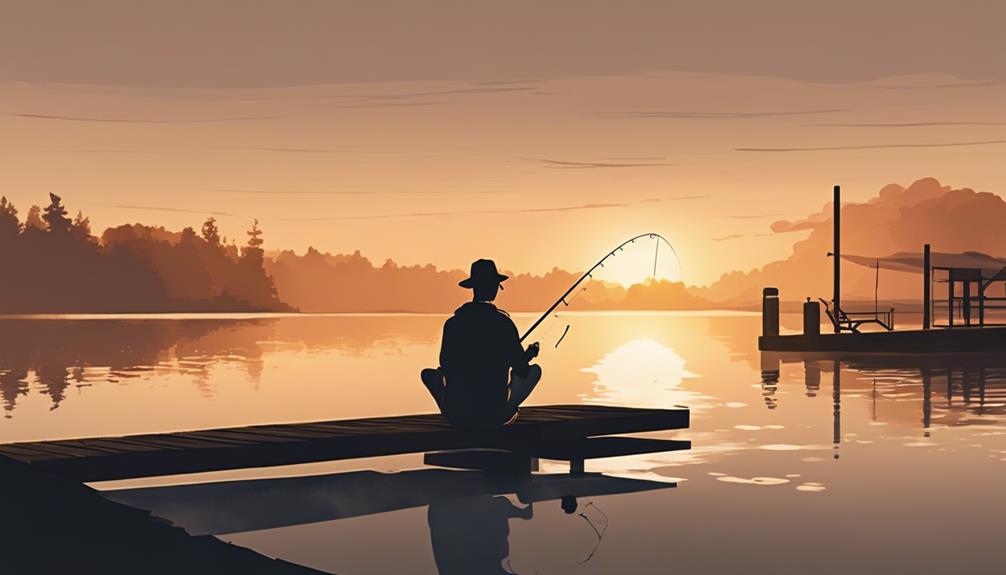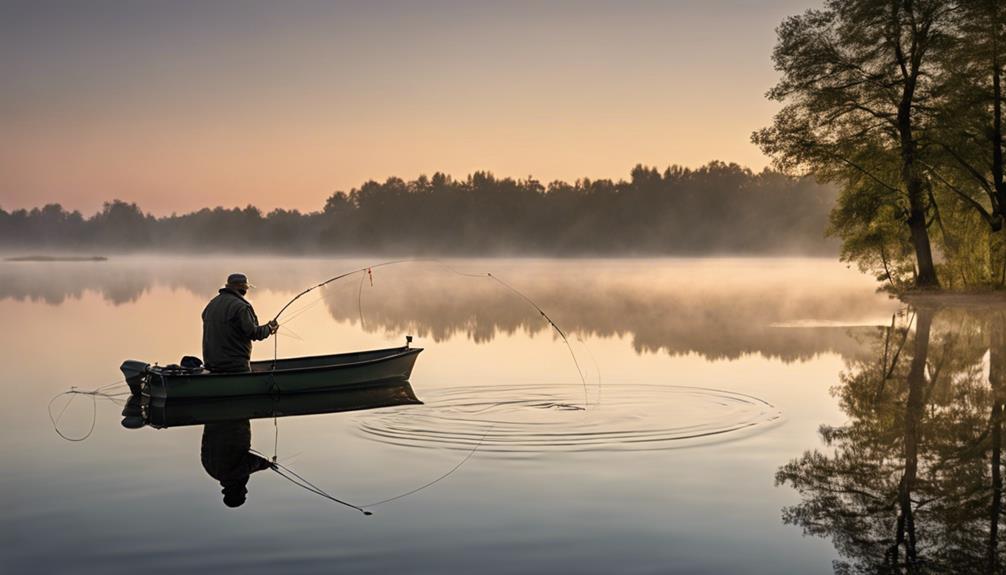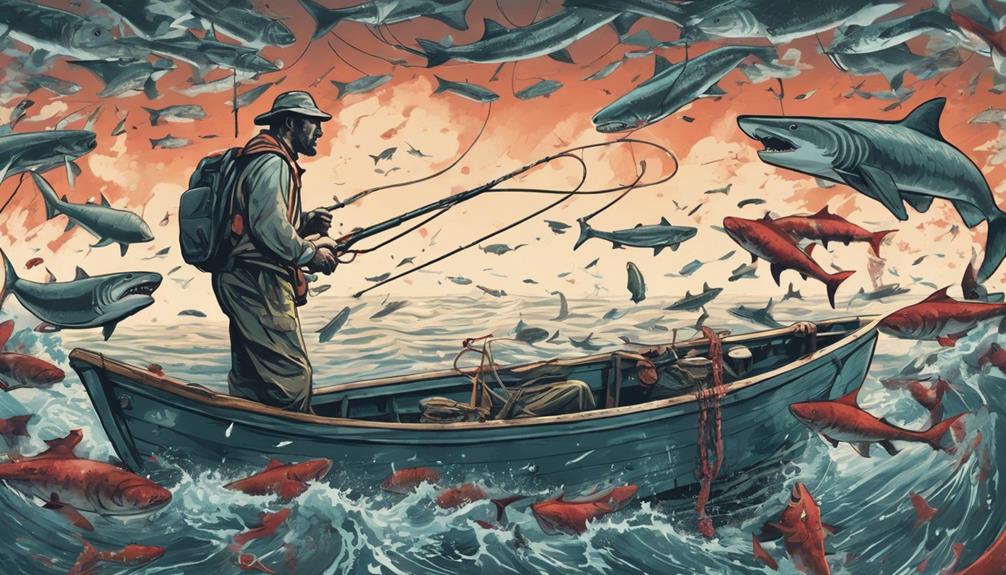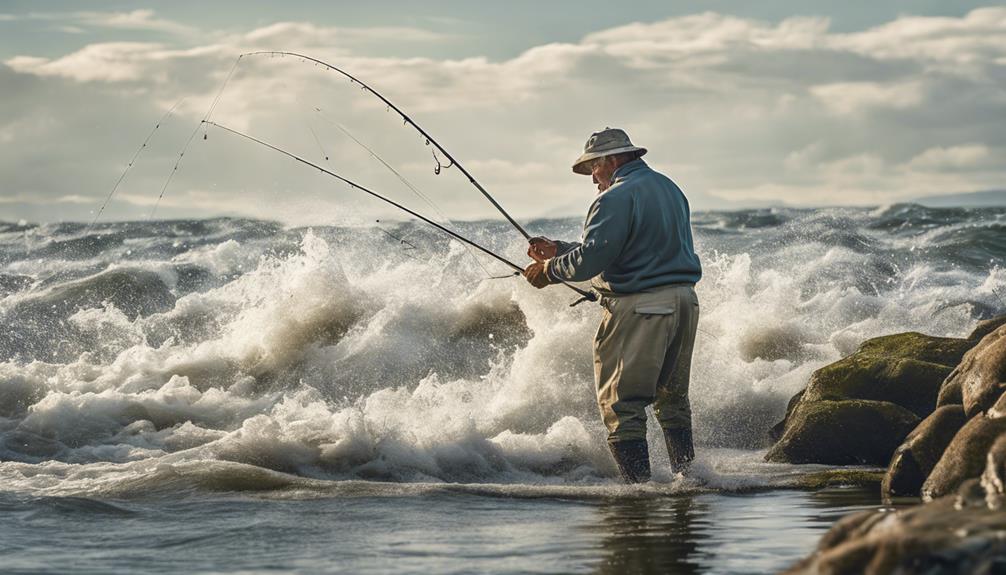Diving into the world of saltwater fishing is like navigating uncharted waters; you must equip yourself with the essential knowledge and skills to sail smoothly. But where does one start?
The art of saltwater fishing entails more than just casting a line into the vast ocean. It requires an understanding of the marine environment, the behavior of fish, and the techniques that can tip the scales in your favor.
So, how do you begin your journey into this captivating aquatic realm?
Selecting the Right Gear
When preparing for saltwater fishing, ensure you have the right gear to maximize your success on the water. Proper handling and gear maintenance are essential for a successful fishing trip. Start by checking your gear before heading out. Make sure your reels are properly lubricated, and the lines aren't frayed. Inspect your rods for any damage and ensure the guides are secure. Taking care of your gear won't only extend its lifespan but also prevent any issues while out on the water.
Proper handling of your gear is crucial. When reeling in a catch, avoid jerking the rod too hard to prevent the line from breaking. Additionally, when landing a fish, use a net to avoid unnecessary stress on the line and rod. Handling your gear with care won't only increase its longevity but also enhance your overall fishing experience.
Regular gear maintenance is key to ensuring everything functions smoothly. Clean your gear after each use to prevent saltwater corrosion. Rinse your rods, reels, and tackle with freshwater and allow them to dry completely before storing them. Store your gear in a cool, dry place to prevent any rust or damage. By following these simple steps, you can keep your gear in top condition and ready for your next saltwater fishing adventure.
Understanding Tides and Currents
To improve your saltwater fishing skills, understanding tides and currents is essential. Tidal patterns play a crucial role in determining fishing success. Fish tend to be more active during specific tidal phases, such as incoming or outgoing tides. During incoming tides, baitfish and other prey are pushed towards the shore, attracting predatory fish. On the other hand, outgoing tides can concentrate fish in deeper waters, making them easier to target.
Current direction is another key factor to consider when fishing in saltwater. Different fish species exhibit varied behaviors in response to currents. For example, some fish prefer to swim against the current to conserve energy while waiting for prey to be carried by. By understanding the direction of the current, you can strategically position yourself to increase your chances of catching fish. Additionally, knowledge of current patterns can help you predict where fish are likely to gather, such as near underwater structures or in eddies where currents create pockets of calm water.
Choosing the Ideal Bait
Choosing the right bait is crucial for increasing your chances of success when saltwater fishing. To make the most out of your fishing experience, consider the following tips:
- Understand Bait Presentation: Matching your bait presentation to the conditions of the fishing spot is essential. Pay attention to the water clarity, current strength, and depth when deciding how to present your bait for the best results. Experiment with different techniques such as free-lining, bottom fishing, or using a bobber to see what works best.
- Explore Different Bait Types: Different fish species are attracted to specific types of bait. Research the common baitfish in the area you're fishing and choose your bait accordingly. Live bait such as shrimp, mullet, or squid can be very effective. Artificial lures like spoons, jigs, or soft plastics also have their place in saltwater fishing. Matching the bait to the fishing strategies you're using can make a significant difference in your catch rate.
- Adapt Your Bait Selection: Be prepared to adapt your bait selection based on the fishing conditions and the behavior of the fish. If you notice that the fish aren't responding to your initial choice of bait, don't be afraid to switch things up. Sometimes a small change in bait type or presentation can make all the difference between a successful day of fishing and going home empty-handed.
Mastering Casting Techniques
Mastering casting techniques is essential for saltwater fishing success, as skilled casting can significantly improve your chances of attracting and hooking fish. To enhance your casting abilities, focus on improving accuracy and increasing distance.
When aiming for accuracy, pay attention to your wrist movement and timing. Smooth, controlled casts are more likely to land where you want them to. Practice in an open area, aiming for specific targets to hone your precision. Remember, accurate casts can make the difference between a successful catch and a missed opportunity.
To increase your casting distance, work on your technique. Start by holding the rod correctly and utilizing the power of your entire body, not just your arms. The proper weight transfer and timing can help you cast further out into the water where the bigger fish might be lurking. Experiment with different casting styles to find what works best for you and practice regularly to build up your strength and muscle memory.
Learning to Set the Hook
Improving your hook-setting technique is crucial for increasing your success in saltwater fishing. Setting the hook properly ensures that the fish stays on the line once it's bitten. Here are some tips to help you master this essential skill:
- Hook Setting Tips
- Timing is Key: Wait for the fish to fully commit to the bite before setting the hook. Feeling the weight of the fish on the line indicates a good time to set it.
- Use a Decisive Motion: When you feel the fish on the line, make a quick and firm hook-setting motion to drive the hook into the fish's mouth.
- Maintain Tension: After setting the hook, keep tension on the line to prevent the fish from throwing the hook.
- Reeling Techniques
- Reel Smoothly: Once the hook is set, reel in the fish smoothly and steadily to avoid giving it slack to escape.
- Adjust Drag: Adjust the drag on your reel according to the fish's size and strength to prevent breaking the line.
- Keep Rod Tip Up: Maintain the rod tip up while reeling to control the fish's movements and prevent it from diving under obstacles.
Handling Fish Properly
Properly handling fish is essential to ensure their well-being and your safety while fishing. When catching fish, always wet your hands before handling them to protect their delicate skin and scales. Avoid touching their gills as it can harm their respiratory system. Use a landing net or grippers to safely bring the fish aboard without causing unnecessary stress. Proper fish handling not only ensures the fish's survival after release but also contributes to fish conservation efforts.
After landing the fish, avoid laying it on hard surfaces that could damage its protective slime layer. If you need to handle the fish, support its body horizontally to prevent injury. If you plan to release the fish, do so quickly and gently back into the water. Hold the fish underwater facing into the current to help oxygenate its gills before letting it swim away. This practice promotes fish conservation by increasing the likelihood of the fish surviving post-catch.
Practicing Patience and Persistence

Exercising patience and persistence is crucial in saltwater fishing to increase your chances of a successful catch. When out on the water, remember these key points:
- Mindful breathing and Visualization: Stay calm and focused by practicing mindful breathing techniques. Visualize yourself reeling in the big catch, feeling the excitement and satisfaction. This mental preparation can help you stay patient during slower moments and maintain your focus.
- Positive reinforcement and Consistent practice: Encourage yourself with positive thoughts and affirmations. Remind yourself that every moment spent fishing is valuable, regardless of the immediate results. By consistently practicing your fishing skills, you not only improve your technique but also cultivate patience over time.
- Stay Present and Engaged: Instead of getting frustrated by the lack of immediate action, immerse yourself in the beauty of the surroundings. Appreciate the sounds of the waves, the feeling of the sea breeze, and the thrill of the unknown beneath the surface. Engaging all your senses can make the waiting more enjoyable and help you stay persistent in your pursuit of the perfect catch.
Safety Tips for Saltwater Fishing
To ensure your safety during saltwater fishing excursions, prioritize understanding and adhering to essential safety tips. Proper hydration is crucial when spending long hours under the sun, so remember to bring an ample supply of water to stay hydrated. Additionally, sun protection is vital to prevent sunburn and heat exhaustion. Wear sunscreen, a wide-brimmed hat, polarized sunglasses, and lightweight clothing to shield yourself from harmful UV rays.
When fishing from a boat, always prioritize boat safety. Ensure that life jackets are readily accessible for all passengers and that you have a working knowledge of how to use all safety equipment onboard. Familiarize yourself with emergency procedures and the location of emergency exits. It's also wise to check the weather forecast before heading out to sea and to inform someone on land about your fishing plans.
Emergency preparedness is key in saltwater fishing. Pack a first aid kit with essentials like bandages, antiseptic wipes, and seasickness medication. Knowing basic first aid procedures can be invaluable in case of an emergency. Additionally, have a communication device such as a VHF radio or a charged cell phone to call for help if needed. By prioritizing safety through proper hydration, sun protection, boat safety, and emergency preparedness, you can enjoy your saltwater fishing experience with peace of mind.
Frequently Asked Questions
How Can I Find the Best Fishing Spots for Saltwater Fishing?
To find the best fishing spots for saltwater fishing, consider tidal patterns and topographic features. Local knowledge from experienced fishermen can be invaluable in pinpointing prime locations.
Additionally, utilize technology advancements like fish finders or apps that offer detailed maps of underwater structures. By combining these resources, you can increase your chances of landing a big catch and making the most of your saltwater fishing excursions.
Are There Any Specific Regulations or Restrictions I Need to Be Aware of When Saltwater Fishing?
When saltwater fishing, it's crucial to adhere to fishing regulations for conservation. Make sure to know rules about catch and release, protecting endangered species.
Stay informed on size limits, bag limits, and no-take zones. These regulations help maintain a healthy marine ecosystem.
Always check local guidelines before heading out to ensure you're fishing responsibly and helping to protect the marine environment.
What Do I Do if I Hook a Fish That Is Too Large for Me to Handle on My Own?
If you hook an oversized fish and can't handle it alone, stay calm. Seek emergency assistance if needed.
If you have a fishing buddy, call for backup. Work together to safely manage the situation. Have a plan in place beforehand for dealing with large catches.
How Can I Prevent Seasickness While Saltwater Fishing?
To prevent seasickness while saltwater fishing, try these tips and remedies.
Start by choosing a bigger boat with stable features. Stay on deck and focus on the horizon. Avoid strong smells and greasy foods.
Ginger or over-the-counter meds like Dramamine can help with nausea. Keep hydrated and get plenty of fresh air.
If you start feeling queasy, lie down and close your eyes for a bit.
Are There Any Specific Weather Conditions I Should Avoid When Planning a Saltwater Fishing Trip?
When planning a saltwater fishing trip, keep an eye on the weather conditions for safety precautions. Avoid going out in extreme weather like heavy storms or high winds. Make sure to have proper equipment on hand to handle changing weather.
Check the forecast before heading out and be prepared for any unexpected changes. By being mindful of weather conditions, you can ensure a safer and more enjoyable fishing experience.
Conclusion
Now that you have mastered the basic techniques for saltwater fishing, you're ready to hit the open waters and reel in some big catches.
Remember to always choose the right gear, understand tides and currents, use the ideal bait, and practice your casting and hook-setting skills.
And most importantly, stay patient, persistent, and safe while enjoying this exciting outdoor activity.
Happy fishing!



